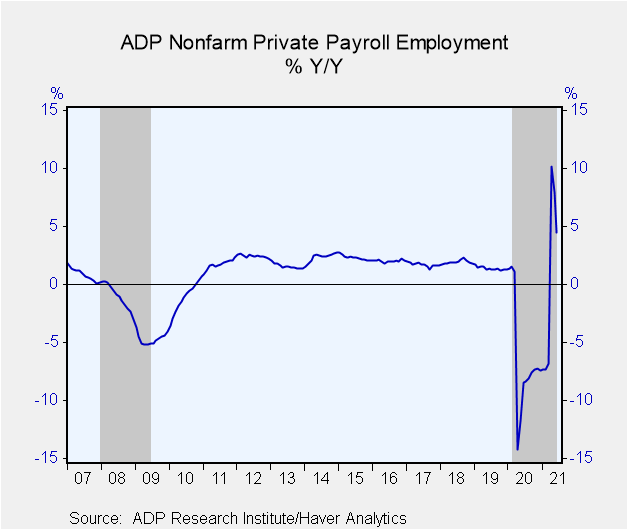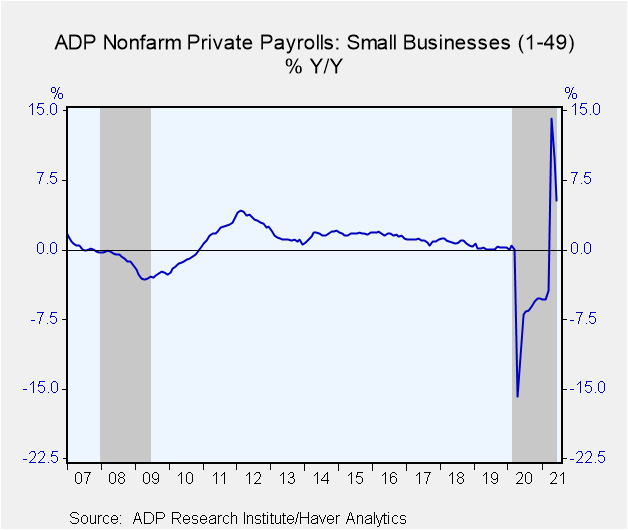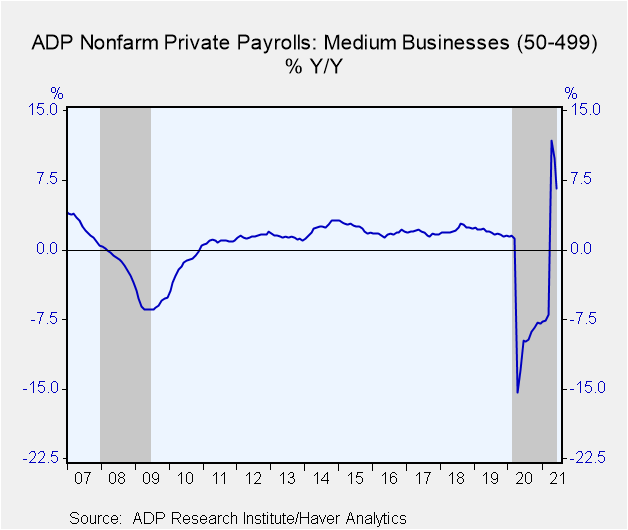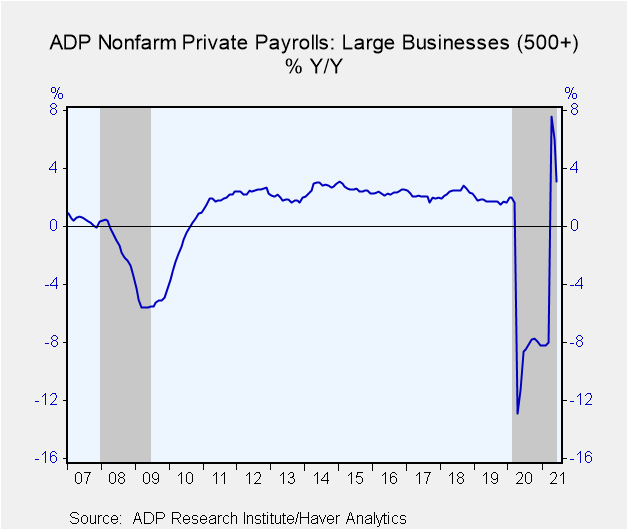 Global| Jun 30 2021
Global| Jun 30 2021U.S. ADP Nonfarm Private Payrolls Increase Firmly in June
by:Tom Moeller
|in:Economy in Brief
Summary
• Increase is unexpectedly strong. • Hiring is robust across business size. • Industry gains led by leisure & hospitality. Job market improvement remains solid. The ADP National Employment Report indicated that June nonfarm private [...]
• Increase is unexpectedly strong.
• Hiring is robust across business size.
• Industry gains led by leisure & hospitality.
Job market improvement remains solid. The ADP National Employment Report indicated that June nonfarm private sector payrolls increased 692,000 (4.5% y/y) during June. A 543,000 rise had been expected in the Action Economics Forecast Survey. The three-month average increase of 733,000 was the strongest since July of last year. The latest gain followed an 886,000 May rise, revised from 978,000 and a 622,000 April increase, revised from 654,000.
Large sized payrolls led the June increase with a 240,000 gain (3.1% y/y) following a 281,000 rise in May, revised from 308,000. Medium-sized payrolls rose 236,000 (6.6% y/y) after improving 309,000 in May, revised from 338,000. Small-sized payrolls grew 215,000 (5.3% y/y) in June after a 296,000 strengthening in May, revised from 333,000.
Within industry sectors, private service employment increased 624,000 in June (4.7% y/y) after improving 783,000 in May, revised from 850,000. The rise was led by a 332,000 strengthening (13.7% y/y) in leisure & hospitality hiring which followed a 414,000 May gain. The number of education & health services jobs rose 123,000 in June (4.1% y/y) and have risen in each month since May of last year. Jobs in trade, transportation & utilities rose 62,000 in June (3.3% y/y) after surging 105,000 in May. A 53,000 rise (3.8% y/y) in the number of professional business services jobs followed a 57,000 May gain. Jobs in financial services improved 10,000 (1.2% y/y) after rising 16,000 in May. The number of information sector jobs fell 4,000 (-0.5% y/y) after rising 2,000 in May.
Employment amongst goods-producing firms increased 68,000 (3.2% y/y) in June following a 103,000 May rise, revised from 128,000. It was the weakest increase in four months. The number of factory sector jobs improved 19,000 this month (2.7% y/y) after rising 44,000 in each of the prior two months. The size of construction sector payrolls rose 47,000 in June (3.8% y/y) following a 50,000 increase. Employment in the natural resource & mining sector rose 2,000 (5.8% y/y), the smallest of five straight monthly increases.
The Automatic Data Processing Research Institute survey covers 411,000 companies and includes about one-fifth of U.S. private payroll employment. The data are processed by Moody's Analytics Inc., then calibrated and aligned with the BLS establishment survey data. The ADP data cover private sector employment only.
The ADP National Employment Report data can be found in Haver's USECON database. Historical figures date back to 2001 for private employment and the industry breakdown, and 2005 for the business size breakout. The expectation figure is available in Haver's AS1REPNA database.
| ADP/Moody's National Employment Report | Jun | May | Apr | Jun Y/Y % | 2020 | 2019 | 2018 |
|---|---|---|---|---|---|---|---|
| Nonfarm Private Payroll Employment (m/m chg, 000s) | 692 | 886 | 622 | 4.5 | -6.4 | 1.4 | 1.9 |
| Small Payroll (1-49) | 215 | 296 | 198 | 5.3 | -5.8 | 0.2 | 0.8 |
| Medium Payroll (50-499) | 236 | 309 | 194 | 6.6 | -7.2 | 1.9 | 2.2 |
| Large Payroll (>500) | 240 | 281 | 231 | 3.1 | -6.3 | 1.7 | 2.4 |
| Goods-Producing | 68 | 103 | 81 | 3.2 | -4.1 | 1.5 | 3.0 |
| Construction | 47 | 50 | 29 | 3.8 | -2.5 | 2.5 | 4.4 |
| Manufacturing | 19 | 44 | 44 | 2.7 | -4.7 | 1.0 | 2.1 |
| Service-Producing | 624 | 783 | 540 | 4.7 | -6.8 | 1.3 | 1.7 |
Tom Moeller
AuthorMore in Author Profile »Prior to joining Haver Analytics in 2000, Mr. Moeller worked as the Economist at Chancellor Capital Management from 1985 to 1999. There, he developed comprehensive economic forecasts and interpreted economic data for equity and fixed income portfolio managers. Also at Chancellor, Mr. Moeller worked as an equity analyst and was responsible for researching and rating companies in the economically sensitive automobile and housing industries for investment in Chancellor’s equity portfolio. Prior to joining Chancellor, Mr. Moeller was an Economist at Citibank from 1979 to 1984. He also analyzed pricing behavior in the metals industry for the Council on Wage and Price Stability in Washington, D.C. In 1999, Mr. Moeller received the award for most accurate forecast from the Forecasters' Club of New York. From 1990 to 1992 he was President of the New York Association for Business Economists. Mr. Moeller earned an M.B.A. in Finance from Fordham University, where he graduated in 1987. He holds a Bachelor of Arts in Economics from George Washington University.
More Economy in Brief
 Global| Feb 05 2026
Global| Feb 05 2026Charts of the Week: Balanced Policy, Resilient Data and AI Narratives
by:Andrew Cates










